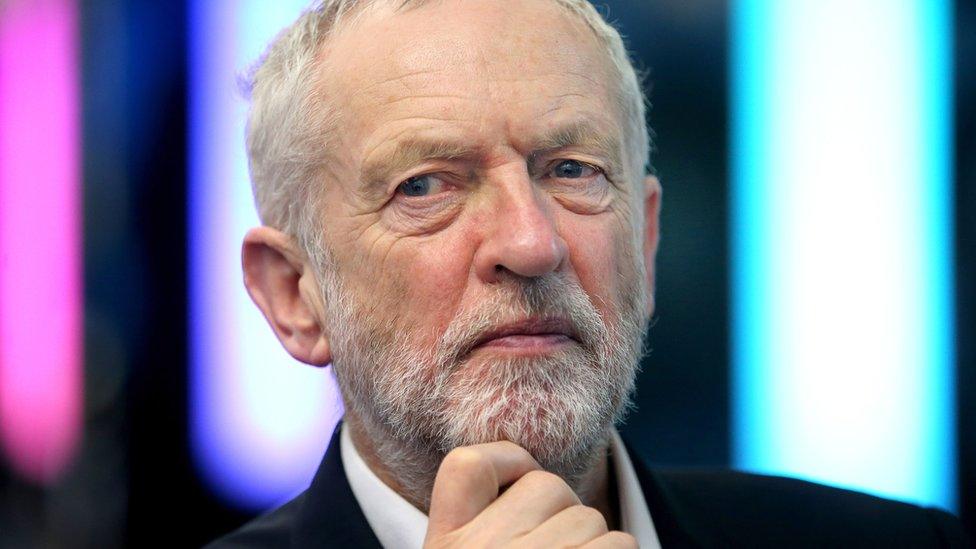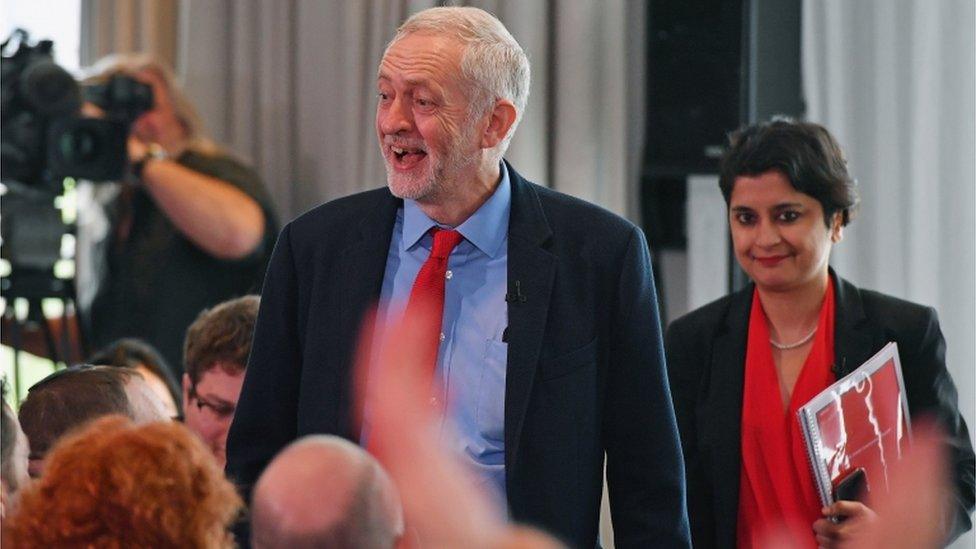Margaret Hodge stands by anti-Semitism attack on Corbyn
- Published
Margaret Hodge says she is "incredibly upset" at Labour's anti-Semitism row
Labour veteran Dame Margaret Hodge has stood by her criticism of Jeremy Corbyn over anti-Semitism - as MPs defied the party's executive on the issue.
"I blew my top," Dame Margaret said, describing her reaction to Labour adopting new anti-Semitism guidelines.
Labour MPs want the party to adopt the International Holocaust Remembrance Alliance, external definition of anti-Semitism, as well as all the examples it lists.
Labour says its version "expands on and contextualises" the IHRA definition.
Labour's new code of conduct was approved by its National Executive Committee last week, but it was criticised by Jewish leaders and some of its own MPs.
Although it includes the definition of anti-Semitism given by the IHRA, it has not incorporated all of the IHRA's "working examples".
Labour MPs will vote in September on whether to adopt the full IHRA wording after passing an emergency motion at a meeting on Monday night.
BBC political correspondent Iain Watson said the 5 September ballot was likely to put Labour MPs on a collision course with the party machine.
Labour has already said it will "reopen development of the code" in consultation with Jewish groups.
'Confront him'
Dame Margaret is facing Labour disciplinary action after confronting Mr Corbyn in the Commons last week, reportedly swearing at him and calling him an anti-Semite.
Speaking to BBC political editor Laura Kuenssberg, she said that when she found out Labour had, despite criticism, adopted the new guidelines: "I blew my top.
"And I thought rather than do what politicians usually do, and talk each other down behind our backs, I would go and confront him."
She said she told him that "for Jewish people to vote Labour was becoming exceedingly tough".

Mr Corbyn has said he is "committed to eliminating anti-Semitism wherever it exists"
Earlier, the Barking MP insisted she would not leave the party, saying: "I am going to fight within the Labour Party - and it is terrible that in 2018 I have to do that."
Mr Corbyn has said he is "committed to eliminating anti-Semitism wherever it exists".
"Prejudice and hatred of Jewish people has no place whatsoever in the Labour Party," he said earlier this year.
The Labour leader in the House of Lords, Baroness Smith, said there was no point agreeing a definition of anti-Semitism if it alienated the Jewish community.
She told BBC Radio 4's Westminster Hour that adopting the full international definition was "the way forward".
Allow X content?
This article contains content provided by X. We ask for your permission before anything is loaded, as they may be using cookies and other technologies. You may want to read X’s cookie policy, external and privacy policy, external before accepting. To view this content choose ‘accept and continue’.

What are the differences?
Labour's code of conduct was drawn up after the 2016 Chakrabarti inquiry. It followed allegations of anti-Semitism within party ranks.
The code does reproduce the International Holocaust Remembrance Alliance's "working definition" of anti-Semitism and lists behaviours likely to be regarded as anti-Semitic - but critics point out that it leaves out four examples provided by the IHRA definition:
Accusing Jewish people of being more loyal to Israel than their home country
Claiming that Israel's existence as a state is a racist endeavour
Requiring higher standards of behaviour from Israel than other nations
Comparing contemporary Israeli policies to those of the Nazis
But Labour has insisted that while the examples are not reproduced word for word, they are covered elsewhere in the new code.
Labour's code says it is "wrong" to accuse Jewish citizens of being more loyal to Israel than their own country. And it says that using Nazi comparisons in Israel-Palestine debates "carries a strong risk of being regarded as prejudicial or grossly detrimental to the party", triggering a disciplinary investigation.
What is Labour doing about anti-Semitism?
Shadow Solicitor-General Nick Thomas-Symonds: Labour making code "stronger and legally enforceable"
Labour's code says: "The party is clear that the Jewish people have the same right to self-determination as any other people.
"To deny that right is to treat the Jewish people unequally and is therefore a form of anti-Semitism."
The code also says Israel's conduct should be assessed "against the requirements of international law or the standards of behaviour expected of democratic states" and that double standards should not be applied.
A party spokeswoman said: "The code of conduct adopts the IHRA (International Holocaust Remembrance Alliance) definition and expands on and contextualises the IHRA examples to produce robust, legally sound guidelines that a political party can apply to disciplinary cases."
- Published26 March 2018

- Published6 July 2018
